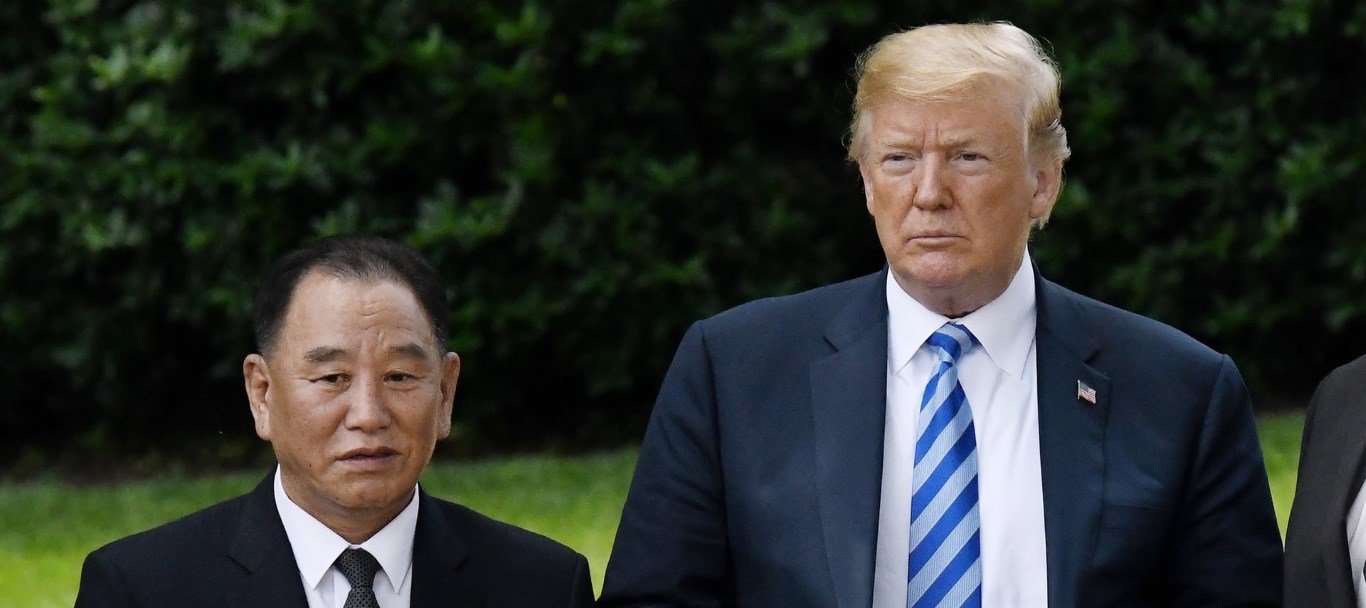Kim-Trump Summit back on
June 2, 2018 | Expert Insights

US President Donald Trump has announced that his meeting with Kim Jong-Un on June 12th is back on. We had predicted this outcome after Trump announced that he would be cancelling the summit in May.
This will be the first meeting between a sitting US President and a North Korean leader.
Background
The history of North Korea began in 1945, when colonial Japan withdrew from the peninsula and Korea was divided into two halves along the 38th parallel. The relationship between the US and North Korea has always been fractious. During the war between North and South Korea in 1950, US forces successfully intervened on behalf of South Korea. 28,500 American soldiers are stationed in South Korea as part of United States Forces Korea (USFK).
The North Korean nuclear program has been a source of concern for the US and the international community for decades. Talks to curb the programme in exchange for relief from sanctions have failed repeatedly. In 2006, after North Korea conducted its first nuclear test, the UN passed harsh economic sanctions on the region. Read more on sanctions here. In 2017, Pyongyang conducted over 20 missile test launches, and conducted its sixth nuclear test. US President Trump has taken an aggressive stance while countering North Korea, threatening “fire and fury like the world has never seen”. Trump has maintained a “maximum pressure” strategy against Pyongyang.
Since January 2018, Pyongyang appeared to have softened its stance, initiating diplomatic meetings. On April 27th, North and South Korean leaders Kim Jong-Un and Moon Jae-In held a historic summit, the first in over a decade. The two nations announced that they had agreed to end the 60-year Korean War and signed the Panmunjom Declaration which agreed to denuclearise North Korea. A meeting was also arranged between the North Korean leader and the US President, the first of its kind.
However, North Korea recently reverted to a more aggressive stance. Pyongyang cancelled a meeting with South Korean officials after joint military drills with Washington. National Security Advisor John Bolton said that the United States was looking at a 2004 “Libya model” to denuclearise North Korea. Pyongyang responded that they would “no longer be interested” in dialogue if the US was trying to push for “unilateral nuclear abandonment.” It threatened a "nuclear-to-nuclear showdown". US President Trump cancelled the summit on May 24th, due to Pyongyang’s “tremendous anger and open hostility”. Read more here.
Analysis
North Korea’s former intelligence chief Kim Yong-Chol visited the White House on June 1st for talks. This was first visit by a North Korean official since 2000, when President Clinton met a special envoy from Kim Jong-Il. Kim Yong-Chol, currently under US sanctions, has been called the “the second most powerful man in North Korea.” He is vice chairman of the ruling Workers’ Party’s Central Committee and has served as a bodyguard to Kim Jong-Un’s father. Read more on Kim Yong-Chol here.
While President Clinton’s meeting with Jo Myong-rok was unsuccessful, Kim Yong-Chol’s two-hour talks concluded with the President Trump announcing that the June 12th summit was back on. "We've got to know their people very well," Trump said, while making sure not to raise expectations for the upcoming summit in Singapore. “You’re talking about years of hostility; years of problems; years of, really, hatred between so many different nations,” he said. “But I think you’re going to have a very positive result in the end.” He emphasised that the US would not go in and sign something straight away, but rather the purpose of the summit would be to “start a process.” Trump also noted that the US has “hundreds of new sanctions ready to go,” however, they won’t be imposed “until the talks break down.”
Trump said that one likely outcome of the summit could be an official end to the Korean War. The two nations had signed an armistice in 1953; however, they had never officially signed a peace treaty. North Korea’s human rights record was not discussed in the recent meeting. US Secretary of Defence James Mattis added that the “separate and distinct” issue of American troops in South Korea would not be on the table and “nor should it be”.
Experts have noted that there may be a huge gap in expectations between Washington and Pyongyang. The US has pushed for North Korea’s "comprehensive, verifiable and irreversible" nuclear disarmament. Meanwhile, Pyongyang has repeatedly stated that it would not accept “unilateral” denuclearisation. In a recent meeting with Russian Foreign Minister Sergei Lavrov, Kim Jong-Un said he “hoped that the [North Korea]-US relations and the denuclearisation of the Korean peninsula will be solved on a stage-by-stage basis,” official news agency KCNA reported. When discussing denuclearisation, Kim Jong-Un’s successors have pressed for denuclearisation of the entire peninsula, including removing the US nuclear umbrella protecting South Korea and Japan.
Assessment
Our assessment is that President Trump's brinkmanship has resulted in a degree of uncertainty around his meeting with Kim Jong-Un. We had predicted earlier that the summit would go forward. However, the talks may be the beginning of a protracted engagement as both sides have differing positions on fundamental issues such as what “denuclearisation” of the Korean peninsula will mean. As noted previously, we feel that the deliberations in Singapore may now include Seoul along with Washington and Pyongyang.








Comments